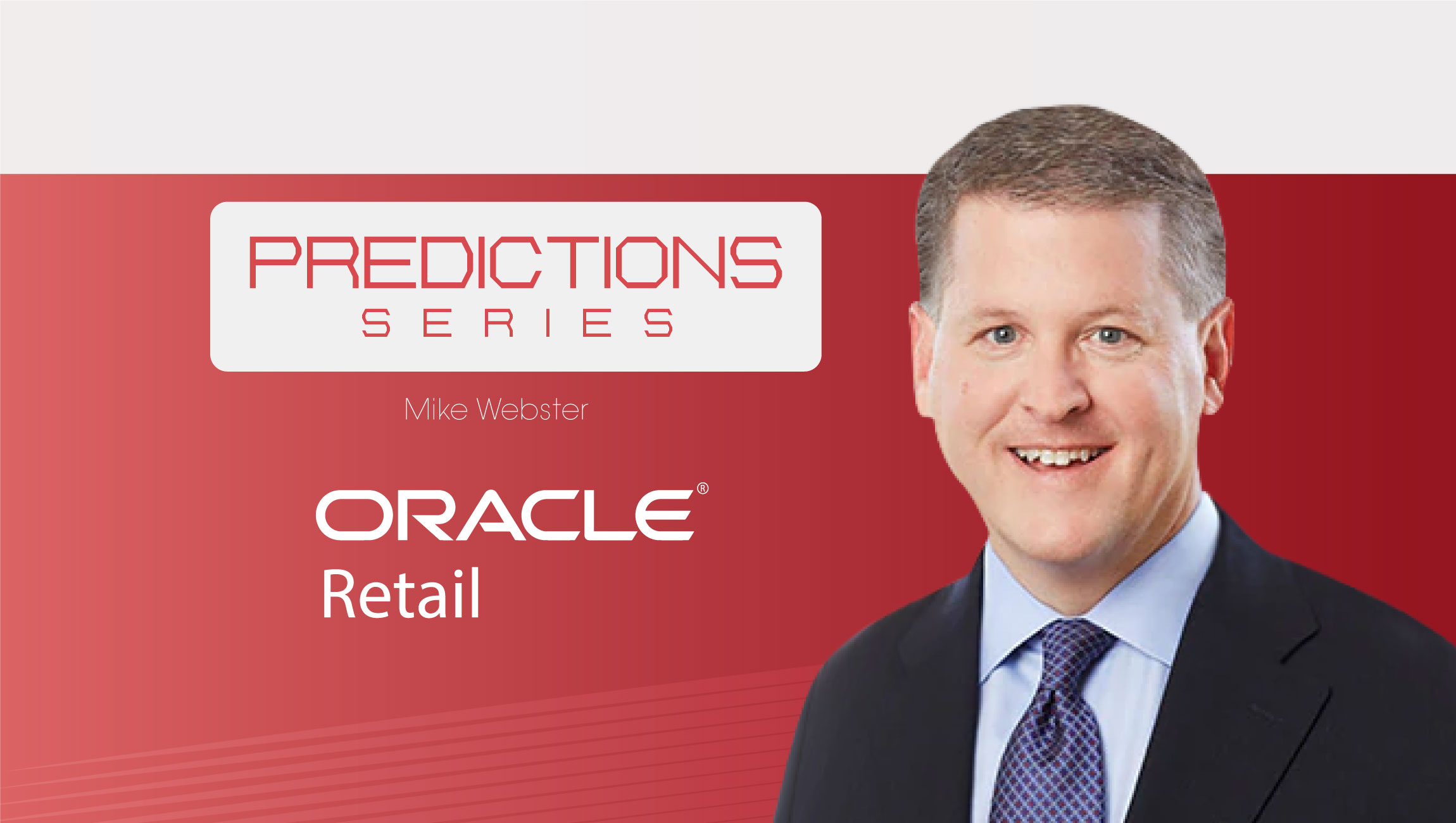“Today, technology has enabled new ways of collecting data. Not only can retailers tap into how consumers are behaving by demographics, but retailers can now tap into the psychographics of a consumer to learn more about what they are thinking.”
[/vc_wp_text]
Hi Mike – please tell us about your role at Oracle and how your role changed in the last 6-8 months at the onset of the COVID-19 crisis?
As senior vice president and general manager of Oracle Retail, I am responsible for strategy, enablement, development, sales, service, and support. Oracle Retail provides deep, industry-specific domain expertise to deliver mission-critical solutions that help customers realize their most important business initiatives.
Over the last 6-8 months, there has been a real emphasis on taking the time to really listen and understand our customers. This year has been completely unprecedented for everyone. As we have taken the opportunity to truly understand the new challenges, we are trying to assemble solutions, quick adjustments to business process and advice that creates a path towards recovery and success.
Consumers are getting “social” with brands online. What are the major factors driving this shift in social commerce?
Consumer preferences for online experiences aren’t limited to shopping alone. Our survey showed that 48% of global consumers reported discovering new brands on social media. As more people have stayed home, social media use has predictably increased. Unable to meet in person, people turn to social channels to connect with friends, share personal updates, get news, and engage in day-to-day conversations. Where consumers go, retailers must follow. As consumer demand grows digital, retailers must expand their visibility on social channels to entice new consumers and capture new shoppers.
Tell us more about your recent Oracle Retail Survey and how e-commerce marketers and retail analysts use the findings to plan their customer acquisition budgets during the Holiday Shopping and New Year seasons?
In an unprecedented year for retail, all eyes are on the holiday season. Our research revealed that many consumers (58%) plan to spend as much or more on holiday gift-giving as in 2019 and that they intend to shop both online and in stores (47%) over a more extended period this holiday season. With ongoing limits on in-person shopping and increased demand for online shopping and alternative fulfillment options, traditional retail milestones like Black Friday and Cyber Monday will evolve into the next generation of retail (online) milestones. Despite the unpredictability of the year, consumer expectations remain high with a slice of forgiveness. Ultimately, retailers must be agile in response. Brands who tap into the inventory irrespective of its location (in-store or in-warehouse), deliver on time via multiple channels, and provide uncompromising online and in-person experiences will win the consumer’s heart this holiday.
How much have consumer experience benchmarks evolved with AI-based recommendations and mobile advertising techniques?
Retailers traditionally leveraged loyalty programs, which measured sales per customer, to track consumer experience. The assumption was that there is a direct correlation between spend and consumer experience, and as a result, advertising techniques fell in line with this – they were price-driven.
As consumers evolved and as technology became the enabler of this evolution, retailers shifted and began tracking Recency, Frequency and Monetary (RFM) trends – when was the last time you shopped with me, how often did you shop with me and how much do you spend with me. Still rooted in loyalty but now tracking the how and when tied to a consumer buying behavior. With the surge and influence of social media, retailers were able to measure sentiment, and omnichannel shopping exposed information about how consumers prefer to shop – not only with a specific brand, but across retail verticals.
Does the same consumer shop differently at a grocer than they do with a fashion retailer or an electronics brand?
Today, technology has enabled new ways of collecting data. Not only can retailers tap into how consumers are behaving by demographics, but retailers can now tap into the psychographics of a consumer to learn more about what they are thinking.
Oracle Data Cloud technology enables retailers to measure consumer behavior – how much time you spend looking at an ad (down to the millisecond), how you interact with the ad, and where you interact with the ad (tablet, phone, smart tv), ultimately helping retailers better understand the effectiveness of their ad (to what extent is it getting your attention) on you as an individual consumer.
Add to this collective third-party consumer data, that tells retailers how consumers are interacting and behaving with complementary and competitive brands, it all drives contextual intelligence. Understanding how consumers spend with competitive and complementary brands will enable a retailer to individualize an offer and predict the optimal time to deliver this offer based on both direct and indirect consumer data.
But, it is not just enough for a retailer to leverage artificial intelligence (AI) and machine learning (ML) to drive mobile advertising techniques. Ultimately the retailer must connect the outbound marketing to the collective inventory and planning processes to ensure that the inventory is available to the consumer in the channel that they want, when they want it – otherwise, the consumer expectations are not met and the value of the insights from AI and ML are not recognized by the retailer. Connecting the PLAN – BUY – MOVE – SELL process into the collective third-party consumer data is critical in accurately measuring the impact of AI and ML recommendations on mobile advertising techniques.
Oracle is a champion in CX management. How do you see these CX Management trends playing out regionally– for example, how are CX trends in the US / Canada different from those in EMEA and APAC? Rose to share content for us to pull from?
Around the world, 71% of consumers say that the speed of service, checkout experience, and delivery options are important to stay loyal to a retailer. Negative experiences, like out of stocks and limited product availability or extended shipping time, drive purchasing decisions as well, and 33% of consumers say that delay of goods equates to a bad shopping experience. While consumers in Australia (32%) and the United Arab Emirates (31%) are in line with global consumers, associating a lousy experience with delayed goods, that number dropped to 26% of consumers in the UK and just 22% in China.
What are your predictions for online retail commerce – which technologies should every marketer adopt to make their campaigns work in 2021?
Omnichannel will be a big player, with about half of the respondents in our survey indicating they’re going to participate in omnichannel journeys this shopping season. A little less than 20% of the respondents are going to take advantage of retailers extending the four walls of the store and use curbside for picking up purchases.
Social media is also going to be a big factor. Retailers who engage with customers via social media have a better chance of standing out in the very crowded holiday ecommerce space. While 48% of global respondents had discovered new brands on social, this is even higher in some countries, including the UAE which saw 80% and China with 75% of respondents reporting they discovered new brands online.
Hear it from the pro- what advice would you give to all retail marketers / marketing professionals in 2020, given the health care pandemic?
It’s critical this season to educate and remind consumers that the delivery window is going to be much tighter this year and they need to order ahead and save time for shipping. In that same vein, communicating about safety procedures is also paramount. Retailers who inform their consumers about store safety procedures, product availability and how to ensure their purchases arrive in time will set themselves ahead this holiday shopping season.
Tag a person in the industry whose answers you would like to see here
Sean Kelly, CMO of ABC Fine Wine and Spirits.
Thank you, Mike! That was fun and hope to see you back on MarTech Series soon.
As senior vice president and general manager of Oracle Retail, Webster is responsible for strategy, enablement, development, sales, service, and support. Oracle Retail provides deep, industry-specific domain expertise to deliver mission-critical solutions that help customers realize their most important business initiatives.
Webster has more than 28 years of retail industry experience, working with hundreds of retailers in more than 30 countries. His expertise spans enterprise applications, data warehousing, and store-automation solutions. He is widely acknowledged for leading the global expansion of self-checkout across multiple formats.
Throughout his career, Webster held various senior management positions in business strategy, corporate communications, and government affairs in service to the retail and hospitality industries. He also led the acquisition of leading self-service solutions for the retail, travel, and healthcare industries. Webster holds a bachelor’s degree in management from the University of Dayton.

Oracle Retail Cloud is part of Oracle.
The Oracle Cloud offers a complete suite of integrated applications for Sales, Service, Marketing, Human Resources, Finance, Supply Chain and Manufacturing, plus Highly Automated and Secure Generations 2 Infrastructure featuring the Oracle Autonomous Database.
The MTS Martech Interview Series is a fun Q&A style chat which we really enjoy doing with martech leaders. With inspiration from Lifehacker’s How I work interviews, the MarTech Series Interviews follows a two part format On Marketing Technology, and This Is How I Work. The format was chosen because when we decided to start an interview series with the biggest and brightest minds in martech – we wanted to get insight into two areas one – their ideas on marketing tech and two – insights into the philosophy and methods that make these leaders tick.











